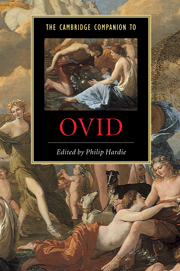18 - Re-embodying Ovid
Renaissance afterlives
from Part 3 - Reception
Published online by Cambridge University Press: 28 May 2006
Summary
Ovid was the most imitated and influential classical author in the Renaissance. This is not surprising, since many of the central preoccupations of his work seem almost to have been calculated to appeal to imitators. He is interested in how texts survive, and in their physical frailty. His writing also repeatedly meditates on the relationship between continuity and change in the universe, in individual lives, and within a poetic oeuvre. This passage from an epistle to his wife in the Tristia brings out all of these concerns:
atque utinam pereant animae cum corpore nostrae,
effugiatque avidos pars mihi nulla rogos!
nam si morte carens vacua volat altus in aura
spiritus, et Samii sunt rata dicta senis,
inter Sarmaticas Romana vagabitur umbras,
perque feros manes hospita semper erit.
(Trist. 3. 3. 59–64)And here I wish my soul died with my breath
And that no part of me were free from death,
For, if it be immortal, and outlives
The body, as Pythagoras believes,
Betwixt these Sarmates’ ghosts, a Roman I
Shall wander, vexed to all eternity.
(trans. Henry Vaughan)- Type
- Chapter
- Information
- The Cambridge Companion to Ovid , pp. 301 - 319Publisher: Cambridge University PressPrint publication year: 2002
- 7
- Cited by



